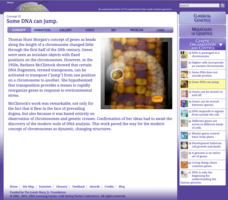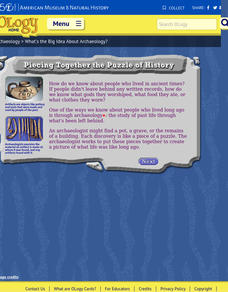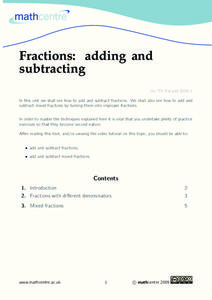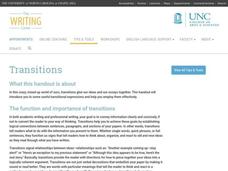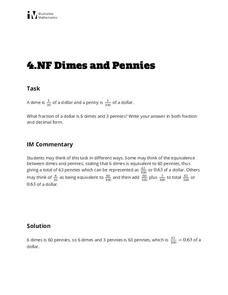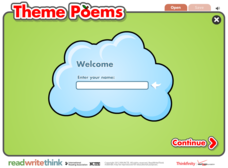Teach Engineering
Biomes and Population Dynamics - Balance Within Natural Systems
How large can a population become? The fifth installment of a nine-part unit teaches young ecologists about limiting factors that determine the carrying capacity of species in the Sonoran Desert. Here is a PowerPoint to help present this...
Curated OER
Western Civilizations, Chapter 16: Scientific Revolution
Engage your historians in the Scientific Revolution with a collection of interactive tools. This section outlines the Scientific Revolution and its significance within the context of the Renaissance. Scholars use the Chrono-Sequencer to...
NOAA
Hurricanes
Here's a hurricane lesson that's sure to catch your eye! Pupils learn about the unique balance of conditions required to form one of nature's most destructive forces. The interactive illustrates how hurricanes form, grow, and affect...
Concord Consortium
The Volume-Pressure Relationship
Pressure and volume are in a relationship, but what is the nature of it? High school scientists discover the link between the volume of a gas and the pressure it exerts using a simulation. The resource tracks pressure in a sidebar as...
Cold Spring Harbor Laboratory
Some DNA Can Jump
Some people have a natural ability to jump, but did you know DNA also naturally jumps? Learn about the fun habit by looking at the research of a pioneering female scientist. Barbara McClintock fought prejudice and surpassed her mentors...
American Museum of Natural History
What's the Big Idea About Archeology
The American Museum of Natural History offers a website sure to engage young anthropologists. Learners can dig into a site that offers an explanation of the field of archaeology, the kinds of questions archaeologists ask that launch...
Math Centre
Fractions: Adding and Subtracting
Young mathematicians piece together the puzzle of fractions. Starting with the addition and subtraction of fractions with like denominators, this series of example problems and skills practice exercises transitions students to working...
Alabama Department of Archives and History
Working in Birmingham's Iron Industry
What did railroads, iron, and industry contributed to Birmingham's successful growth? The lesson explains how the iron industry worked. It also describes how the location of Birmingham and its proximity to railroads. played a key role in...
K-5 Math Teaching Resources
Elapsed Time Ruler Sample 1 x 4 Rulers
Who knew that you could measure time with a ruler? This great printable resource allows young mathematicians to visualize the hours of the day as they learn to calculate elapsed time.
National Wildlife Federation
Yesterday: Our Energy Needs Over Time
How has our relationship to energy changed over time? An engaging exploration challenges learners to create a timeline showing human energy needs and uses over time. Scholars review what timelines are, choose a 50-year period in history...
PBS
NOVA Cybersecurity Lab Game
It's important to protect yourself online. An online game has pupils imagine themselves as cybersecurity specialists at a social networking company. They learn about ways to protect data online through a series of challenges.
University of California
Decolonization
The ripple effect from one small event can impact many others. Young historians research the ripple effect World War II had on decolonization in the second installment of an eight-part series. Through primary and secondary documents as...
University of North Carolina
Transitions
Ideas don't naturally flow from one to another. They need transitions to help them connect. Part of a larger Writing the Paper series, the resource introduces writers to the concept of using transitions in their writing. Topics covered...
American Psychological Association
A Career in Psychology
Could you have a future therapist in your high school Psychology classroom? Find out by assigning the class to complete an activity where they discover more information about what a career in psychology looks like. Resources they view...
Teach Engineering
Life Cycles
Breathe some life into product design. Pupils learn about the stages of product creation, use, and disposal—sometimes called a cradle-to-grave assessment. They see how this cycle relates to the life cycle of organisms.
Curated OER
Evidence of Evolution by Natural Selection
Walk your junior biologists through the evidence that supports evolution. The fossil record, anatomical record, and molecular record are explained and supported by colorful graphs and pictures. Extensive notes are provided for some of...
Illustrative Mathematics
Dimes and Pennies
Help your fourth graders make cents out of fractions and decimals with this short word problem. After learning that dimes are one-tenth and pennies one-hundredth of a dollar, students write a fraction and decimal for a given number of...
Atlanta History Center
Civil Disobedience and the Atlanta Student Movement
What tactics are used in civil disobedience? Learners study the conditions in Alabama that led to the establishment of the Atlanta Student Movement, as well as consider the nature and effectiveness of civil disobedience.
Ready Houston
Make a Plan. Build a Kit. Stay Informed.
Help prepare your youngsters for an emergency or natural disaster by discussing important topics as where to meet, how to remain in contact, and what belongs in an emergency kit.
ReadWriteThink
Theme Poems
Continue celebrating Poetry Month with an interactive whose focus is writing shape, or theme, poems. Young poets choose from nature, school, shapes, sports, and celebration themes. Then, they brainstorm words that have to do with the...
Massachusetts Institute of Technology
Auroras
Learn the science behind one of the most beautiful acts of nature. A comprehensive lesson explores the causes and characteristics of auroras. The instruction also explains the differences among auroras and what the differences indicate...
Beyond Benign
Daphnia Bioassay LD50
De-icing materials may have a harmful effect on our environment; have your class perform an experiment to test the nature of these effects. Scholars monitor the survival rate of a sample of daphnia as the concentration of a de-icing...
Colorado State University
How Can You Demonstrate the Different Efficiencies of Different Light Bulbs?
Need a bright idea for an engaging lab? Watch your class light up as they explore the difference in efficiency between incandescent and LED bulbs! The resource makes use of simple materials and encourages learners to infer what's...
US Institute of Peace
Defining Conflict
Conflict is everywhere—but is it avoidable? The first activity in a series of 15 peacebuilding lessons examines the nature of conflict at home, school, and across the world. Learners develop a definition of conflict through group work...






